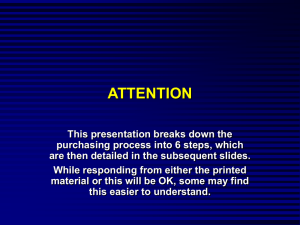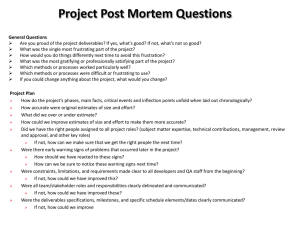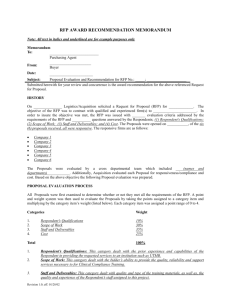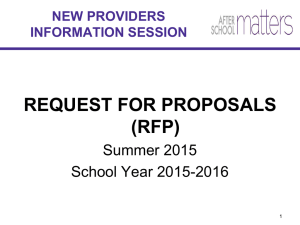FINANCIAL MANAGEMENT
advertisement
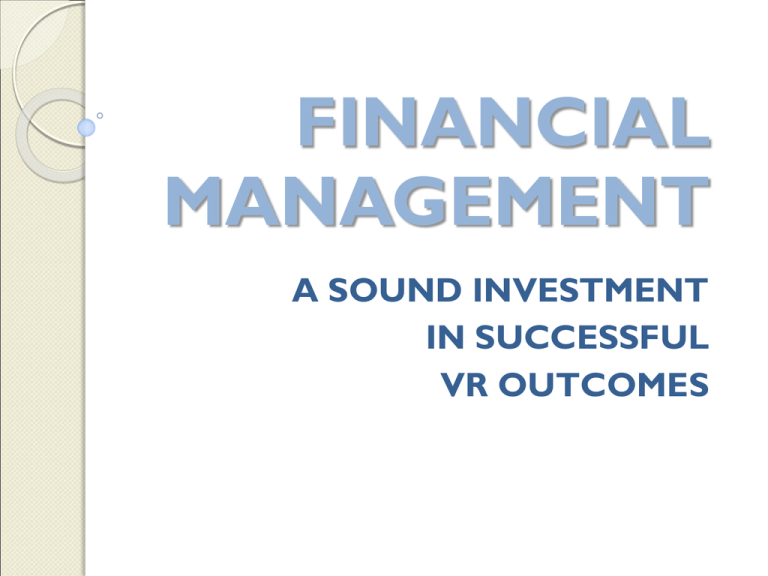
FINANCIAL MANAGEMENT A SOUND INVESTMENT IN SUCCESSFUL VR OUTCOMES Fiscal Controls and Contract Management CONTRACT DEVELOPMENT AND ADMINISTRATION 34 CFR 361.12 and 34 CFR 80.20(a) Presenters: Tanielle Chandler, Financial Management Specialist, U.S. Department of Education, Rehabilitation Services Administration, tanielle.chandler@ed.gov, (202) 245-6211 Larry Vrooman, Vocational Rehabilitation Program Specialist, U.S. Department of Education, Rehabilitation Services Administration, lawrence.vrooman@ed.gov , (202) 245-6523 What is the purpose of contract administration? Allows agency directors and contract managers to decide what management and program practices will result in the most efficient, effective, and accountable service contract. Why is contract administration necessary? To ensure that the agency follows the state’s procurement laws To ensure the best return on investment (ROI) To ensure that the agency establishes and maintains written policies to govern the rates of payment for all purchased VR services DECISION TO CONTRACT Determine whether or not to contract for the service: Analyze business needs, goals, objectives, and services; Conduct a cost/benefit analysis; and Determine whether state law either prohibits contracting for services or requires the agency to demonstrate its need to contract. Proper planning provides the foundation for contract awarding and monitoring by: Identifying what services are needed, when they are needed, how they should be provided, what provisions should be in the contract, and how performance will be evaluated. Ensuring that proper information is collected to effectively structure a request for proposal (RFP) or other procurement tool. Planning for a contract… As a public entity, the agency must know and follow: • The state's bidding and contracting laws; • Other relevant state laws; and • Any procedural guidelines the agency is obligated to follow. Request for Proposal (RFP) Issuing a Request for Proposal allows the agency to systematically: • Define the acquisition process; • Define the criteria used to evaluate the proposals; • Specify any methods, promising or evidence based practices that should be utilized; • Provide a standardized framework for vendor proposals and; • Highlight the business, technical and legal issues that must be included in the final contract. The RFP should: Clearly state the performance requirements and the scope of the services that are to be provided; Include a statement of work that flows from the business needs analysis and presents a logical plan to address the stated needs; Identify preferred methods, constraints, schedules, deadlines, mandatory items, and allowable renewals; Specify required deliverables, reporting obligations and payment terms; RFP (con’t) Clearly state pricing requirements and bid submission expectations, including closing time, date, and location; Clearly state the evaluation criteria and weighting factors for scoring proposals; Allow sufficient time for vendors to prepare good proposals; Avoid specifications that favor a particular bidder or brand; RFP (con’t) Specify the qualifications for the company and/or personnel who would be assigned to the project; Identify federal and state requirements that govern the contracting process and the delivery of services; and Outline all procurement communication devices to ensure all appropriate bidders or potential bidders have access to the same information, i.e. pre-bid conferences, Q & A's, whom to contact with questions, etc. Contract Provisions Specifically, the contract should: State and define the scope of work, contract terms, allowable renewals and procedures for any changes; Provide for specific measurable deliverables and reporting requirements, including due dates; Describe the methods of payment, payment schedules, and escalation factors; Contract Provisions (con’t) Limit the state’s liability for work performed either before or after the contract’s scope; Contain performance standards, performance incentives and/or clear penalties and corrective actions for non-performance, with a dispute resolution process; Contain inspection and audit provisions; Include provisions for contract termination; Include provisions for contract renegotiation; Contract Provisions (con’t) Tie payments to the acceptance of deliverables or the final product, or service outcome if possible; Contain all standard or required clauses as published in the RFP; Contain appropriate signatures, approvals, and acknowledgements; and As necessary, allow for legal counsel's review of the legal requirements for developing the contract, which may include a review of the contracting process, legal sufficiency of the contract, and terms of the contract. Performance Requirements Develop measureable performance requirements that will hold vendors accountable for the timely delivery of quality services. Whenever possible, develop performance requirements based on well defined quality outcomes rather than processes. Performance requirements should: State the services expected; Define performance standards and measurable outcomes; Identify how vendor performance will be evaluated; Include positive and negative performance incentives; Identify the staff that will be responsible for monitoring vendor performance; and Define the procedures to be followed if unanticipated barriers arise that require modification to the contract. CONTRACT MONITORING 34 CFR 80.40(a) Contract monitoring is an essential part of the contracting process Monitoring should ensure that: • Contractors comply with contract terms; • Performance expectations are achieved; and • Any problems are identified and resolved. A sound monitoring process ensures that the VR agency receives the appropriate contracted services. To properly monitor a contract, the agency should: Assign a contract manager with the authority, resources, and time to monitor the project; Track budgets and compare invoices and charges to contract terms and conditions; Contract Monitoring (con’t) Ensure all deliverables are received on time and are of sufficient quality; Document the acceptance or rejection of all deliverables; Withhold payments to vendors until deliverables are received; Retain documentation supporting charges against the contract; and Evaluate the contractor's performance on the contract against a set of preestablished criteria. Challenges… Contract Administration challenges include: Time allocated to awarding contracts versus time allocated to administering existing contracts; Unclear roles and responsibilities of the DSU contracting officer; Unclear statements of work that hinder contractor performance; and Inadequate guidance on invoice processing and contract closeout. Strategies for Successful Contract Development and Administration Develop measurable goals for delivered services and outcomes. Payments should be based on specified deliverables and outcomes. Milestone payments should be outcome based rather than on hours spent with an individual being served. Ensure that deliverables, specified in the contract, are received and of acceptable quality before payment is processed. Strategies (con’t) Ensure that services are received by the individual before payment is processed. Implement a quality assurance (QA) process that includes monitoring of community rehabilitation programs (CRPs) and other vendors. Document the QA process. Utilize the results of the QA process to improve current services as well as future request for proposals (RFPs), contracts and services. What Findings has RSA Identified Related to Contract Development and Administration? VR agencies do not comply with 34 CFR 80.40(a) to monitor all grant-supported activities to assure compliance with applicable federal requirements and that performance goals are achieved. Education Department General Administrative Regulations (EDGAR) - http://www.ed.gov/policy/fund/reg/edgarReg/edgar.html QUESTIONS?
